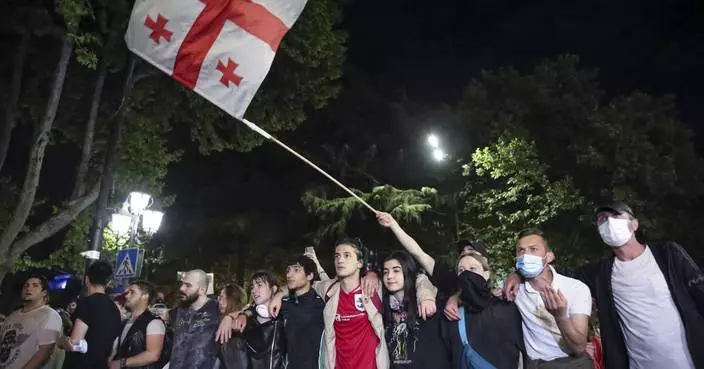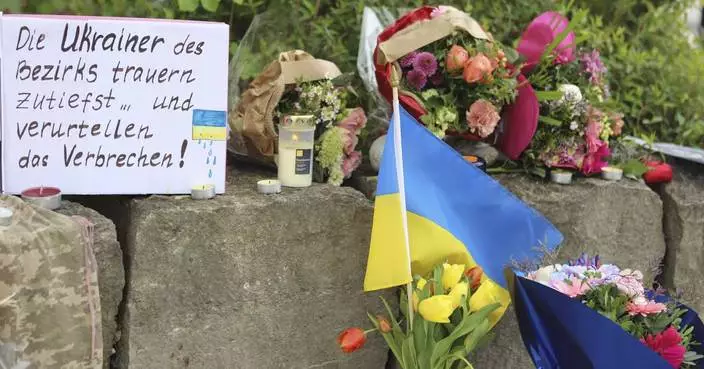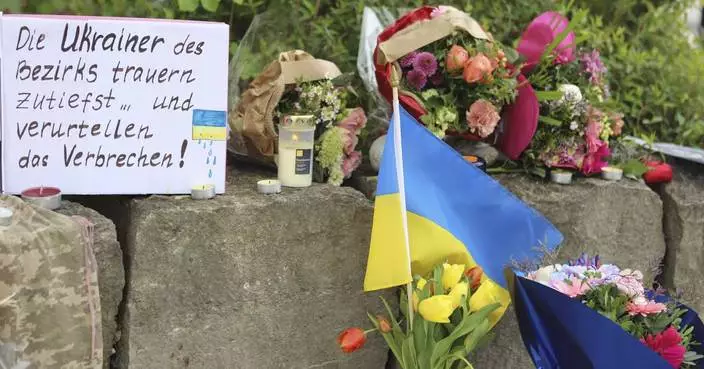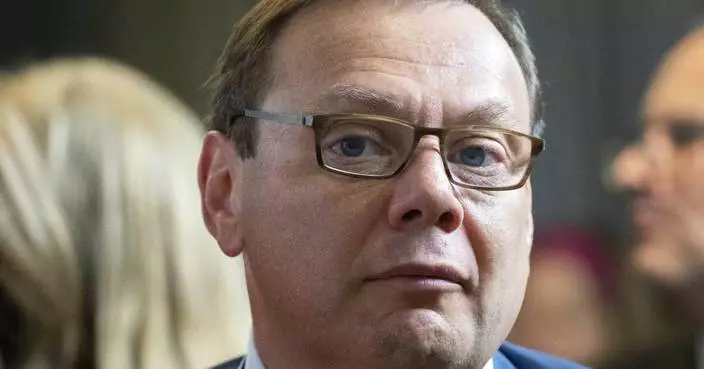A Russian celebrity TV host shook up the country's political scene Wednesday by announcing her presidential bid, a move that would likely boost public interest in the race but could further fragment the nation's beleaguered opposition.

FILE - In this file photo taken on Wednesday, Jan. 18, 2012, Russian socialite and TV host Ksenia Sobchak, daughter of the late St. Petersburg mayor, Anatoly Sobchak, speaks to journalists during her interview in the Echo Moskvy (Echo of Moscow) radio station in Moscow, Russia. (AP Photo/Alexander Zemlianichenko, File)
Ksenia Sobchak, 35, announced her intention to become a candidate in March's election in a YouTube video, arguing that Russia has grown tired of its current political elite and needs a change.
Sobchak, the daughter of Anatoly Sobchak, the reformist St. Petersburg mayor in the early 1990s, first became known as a socialite and a fashion icon before she launched her successful TV career.
Sharp-tongued and witty, Sobchak has been often critical of the Russian government. She joined anti-Kremlin protests in Moscow in 2011-2012 but has largely avoided criticizing President Vladimir Putin, who once worked as her father's deputy.
Putin, 65, hasn't yet said whether he will seek re-election on March 18 but he's widely expected to run. With approval ratings topping 80 percent, Putin would win in landslide against torpid veterans of past Russian presidential campaigns, like Communist leader Gennady Zyuganov, ultranationalist Vladimir Zhirinovsky or liberal Grigory Yavlinsky. They have all signaled their intentions to run again in 2018.
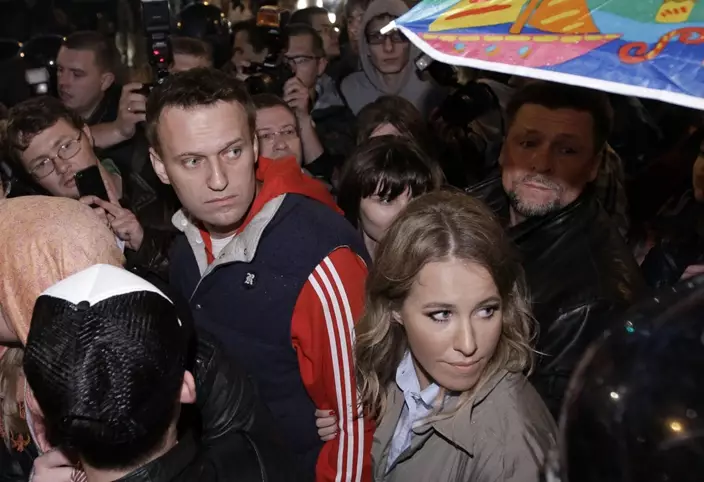
FILE In this file photo taken on Tuesday, May 8, 2012, Russian socialite and TV host Kseniya Sobchak, right bottom, daughter of the late St. Petersburg mayor, Anatoly Sobchak, and Alexei Navalny, a prominent anti-corruption whistle blower and blogger, center, walk with protesters in Moscow, late Tuesday, May 8, 2012, a day after Putin's inauguration. (AP Photo/Sergey Ponomarev, file)
Sobchak told Dozhd TV that she had warned Putin that she planned to join the race while interviewing him recently for a documentary about her father.
"I had an impression he didn't like it," she said of Putin's reaction.
Some pundits, however, said Sobchak's candidacy should please the Kremlin, helping counter growing voter apathy without posing a threat to Putin. Andrei Kolesnikov, an expert with the Carnegie Moscow Center, warned that Sobchak's bid would further fragment and weaken Russia's opposition.
When rumors about Sobchak's intentions first appeared recently, Russia's most popular opposition leader, Alexei Navalny, warned her on YouTube that she would play into the Kremlin's hands if she enters the race. Navalny is currently serving a 20-day jail term for organizing an unsanctioned protest.
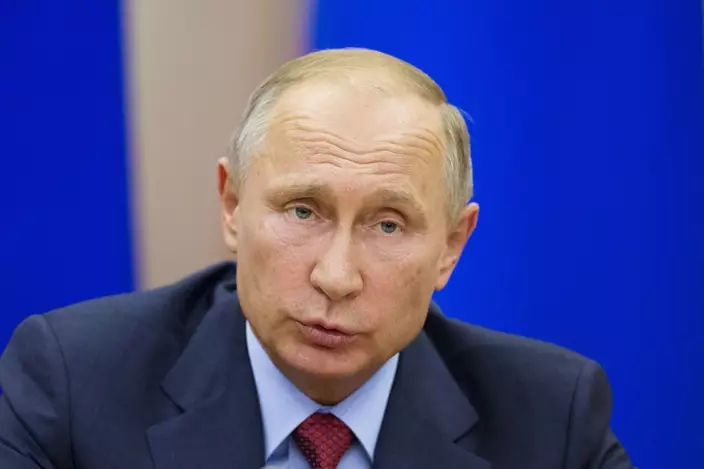
Russian President Vladimir Putin speaks during his and Croatia's President Kolinda Grabar-Kitarovic joint news conference after their talks in the Bocharov Ruchei residence in the Black Sea resort of Sochi, Russia, Wednesday, Oct. 18, 2017. (AP Photo/Alexander Zemlianichenko, Pool)
Navalny has also declared his intention to enter Russia's presidential race, even though a criminal conviction that he calls politically motivated bars him from running. The 41-year-old anti-corruption crusader has organized a grassroots campaign across Russia to support his nomination. It has organized waves of protests this year, putting pressure on the Kremlin.
"They need a cartoonish liberal candidate at a time when they don't want to allow me to enter the race," Navalny said in a warning to Sobchak.
Sobchak has rejected Navalny's criticism, saying that if he is allowed to run she would consider withdrawing her candidacy in his favor. She has cast herself as a "candidate against all," appealing to broad public dismay with Russia's tightly-controlled and corrupt political system.
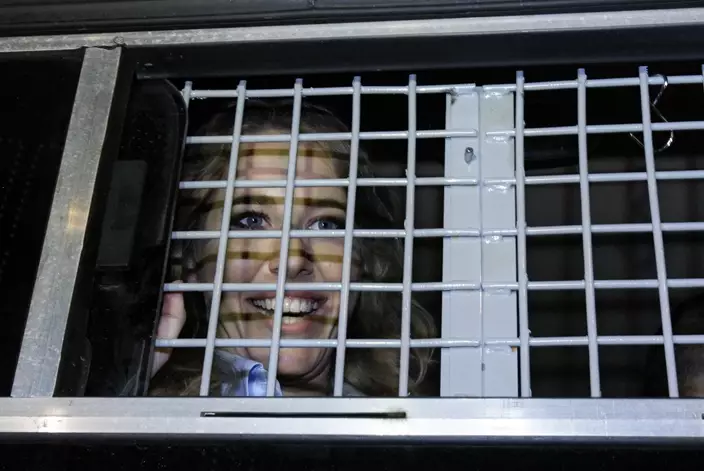
FILE - In this file photo taken on Tuesday, May 8, 2012, Russian socialite and TV host Kseniya Sobchak, daughter of the late St. Petersburg mayor, Anatoly Sobchak seen behind the bars in the police van after she was detained during protests in Moscow, Russia. (AP Photo/Sergey Ponomarev, file)
Like other self-nominated candidates, Sobchak needs to gather 300,000 signatures to get registered for the race. Those nominated by parties represented in parliament don't need to do that.
The candidates haven't reached the formal registration stage so there is no exact count of their number yet.
Sobchak wouldn't discuss possible sources of funding for her campaign in a nation as vast as Russia, but her high-level connections in Russia's business world could help her bid.
TBILISI, Georgia (AP) — Georgia has been engulfed by huge protests triggered by a proposed law that critics see as a threat to media freedom and the country’s aspirations to join the European Union.
Here is a look at the bill and the protests it has ignited:
The bill would require media and nongovernmental organizations and other nonprofits to register as “pursuing the interests of a foreign power” if they receive more than 20% of funding from abroad.
The legislature approved a second reading of the bill Wednesday, and the third and final reading is expected later this month.
The proposed legislation is nearly identical to the one that the governing Georgian Dream party was pressured to withdraw last year after street protests.
The governing party says the bill is necessary to stem what it deems as harmful foreign influence over the country’s political scene and to prevent unidentified foreign actors from trying to destabilize the country’s political scene.
The opposition denounces the bill as “the Russian law” because Moscow uses similar legislation to stigmatize independent news media and organizations critical of the Kremlin. Opponents of the bill say the fact that it is now before parliament is a sign of Moscow’s purported influence over Georgia. They fear it will become an impediment to the country’s long-sought prospects of joining the European Union.
Georgian President Salome Zourabichvili, who is increasingly at odds with the governing party, has vowed to veto the law, but Georgian Dream has a majority sufficient to override a presidential veto.
Russia-Georgia relations have been strained and turbulent since the 1991 collapse of the Soviet Union.
In August 2008, Russia fought a brief war with Georgia, which had made a botched attempt to regain control over the breakaway province of South Ossetia. Moscow then recognized South Ossetia and another separatist province, Abkhazia, as independent states and beefed up its military presence there. Most of the world considers both breakaway regions to be parts of Georgia, a former Soviet republic.
Tbilisi has ruptured diplomatic ties with Moscow, and the separatist regions’ status remains a key irritant, even as Russia-Georgia relations have improved in recent years.
The opposition United National Movement accuses Georgian Dream, which was founded by Bidzina Ivanishvili, a billionaire who made his fortune in Russia, of serving Moscow’s interests — an accusation the governing party vehemently denies.
For several successive days, thousands of demonstrators besieged the parliament building in a bid to block the bill’s passage and scuffled with police.
Police used tear gas and water cannons to disperse the crowds. Over 60 protesters have been arrested and several people have been injured. Levan Khabeishvili, chairman of the United National Movement, was among those injured.
On Thursday, parliament canceled its scheduled session, saying the move was because of damage to the building during Wednesday’s protests.
Another demonstration by thousands of people took place on Friday night, including a march to protest outside Georgian Dream's headquarters, but there were no reports of clashes.
EU foreign policy chief Josep Borrell has described the parliament’s move as “a very concerning development” and warned that “final adoption of this legislation would negatively impact Georgia’s progress on its EU path.”
“This law is not in line with EU core norms and values,” Borrell said in a statement last month. “The proposed legislation would limit the capacity of civil society and media organizations to operate freely, could limit freedom of expression and unfairly stigmatize organizations that deliver benefits to the citizens of Georgia.”

A demonstrator gestures standing between opposition protesters who gather to protest against "the Russian law" in Tbilisi, Georgia, on Tuesday, April 30, 2024. Clashes erupted between police and opposition demonstrators protesting a new bill intended to track foreign influence that the opposition denounced as Russia-inspired. (AP Photo/Zurab Tsertsvadze)

Riot police use a water cannon during an opposition protest against "the Russian law" near the Parliament building in Tbilisi, Georgia, Tuesday night, April 30, 2024. Clashes erupted between police and opposition demonstrators protesting a new bill intended to track foreign influence that the opposition denounced as Russia-inspired. (AP Photo/Zurab Tsertsvadze)

EDS NOTE: OBSCENITY - A demonstrator gestures trying as riot police use a water cannon during an opposition protest against "the Russian law" near the Parliament building in Tbilisi, Georgia, Tuesday night, April 30, 2024. Clashes erupted between police and opposition demonstrators protesting a new bill intended to track foreign influence that the opposition denounced as Russia-inspired. (AP Photo/Zurab Tsertsvadze)

Police use water cannons and tear gas against demonstrators during an opposition protest against "the Russian law" near the Parliament building in Tbilisi, Georgia, on Wednesday, May 1, 2024. Protesters denounce the bill as "the Russian law" because Moscow uses similar legislation to stigmatize independent news media and organizations critical of the Kremlin. (AP Photo/Zurab Tsertsvadze)

Police face demonstrators during an opposition protest against "the Russian law" near the Parliament building in Tbilisi, Georgia, on Wednesday, May 1, 2024. Protesters denounce the bill as "the Russian law" because Moscow uses similar legislation to stigmatize independent news media and organizations critical of the Kremlin. (AP Photo/Zurab Tsertsvadze)

A demonstrator gestures while arguing with the police during an opposition protest against "the Russian law" near the Parliament building in Tbilisi, Georgia, on Wednesday, May 1, 2024. Protesters denounce the bill as "the Russian law" because Moscow uses similar legislation to stigmatize independent news media and organizations critical of the Kremlin. (AP Photo/Zurab Tsertsvadze)

Demonstrators wave Georgian national flag during an opposition protest against "the Russian law" near the Parliament building in Tbilisi, Georgia, on Wednesday, May 1, 2024. Protesters denounce the bill as "the Russian law" because Moscow uses similar legislation to stigmatize independent news media and organizations critical of the Kremlin. (AP Photo/Zurab Tsertsvadze)

A woman shows a heart standing in front of riot police during an opposition protest against "the Russian law" near the Parliament building in Tbilisi, Georgia, on Wednesday, May 1, 2024. Clashes erupted between police and opposition demonstrators protesting a new bill intended to track foreign influence that the opposition denounced as Russia-inspired. (AP Photo/Zurab Tsertsvadze)

Demonstrators scuffle with riot police during an opposition protest against "the Russian law" near the Parliament building in Tbilisi, Georgia, on Wednesday, May 1, 2024. Clashes erupted between police and opposition demonstrators protesting a new bill intended to track foreign influence that the opposition denounced as Russia-inspired. (AP Photo/Zurab Tsertsvadze)

A couple embrace during an opposition protest against "the Russian law" near the Parliament building in Tbilisi, Georgia, on Wednesday, May 1, 2024. Clashes erupted between police and opposition demonstrators protesting a new bill intended to track foreign influence that the opposition denounced as Russia-inspired. (AP Photo/Zurab Tsertsvadze)

Demonstrators sit in front of police line during an opposition protest against "the Russian law" near the Parliament building in Tbilisi, Georgia, on Tuesday, April 30, 2024. Clashes erupted between police and opposition demonstrators protesting a new bill intended to track foreign influence that the opposition denounced as Russia-inspired. (AP Photo/Zurab Tsertsvadze)

Riot police use a water cannon during an opposition protest against "the Russian law" near the Parliament building in Tbilisi, Georgia, on Wednesday, May 1, 2024. Clashes erupted between police and opposition demonstrators protesting a new bill intended to track foreign influence that the opposition denounced as Russia-inspired. (AP Photo/Zurab Tsertsvadze)



















